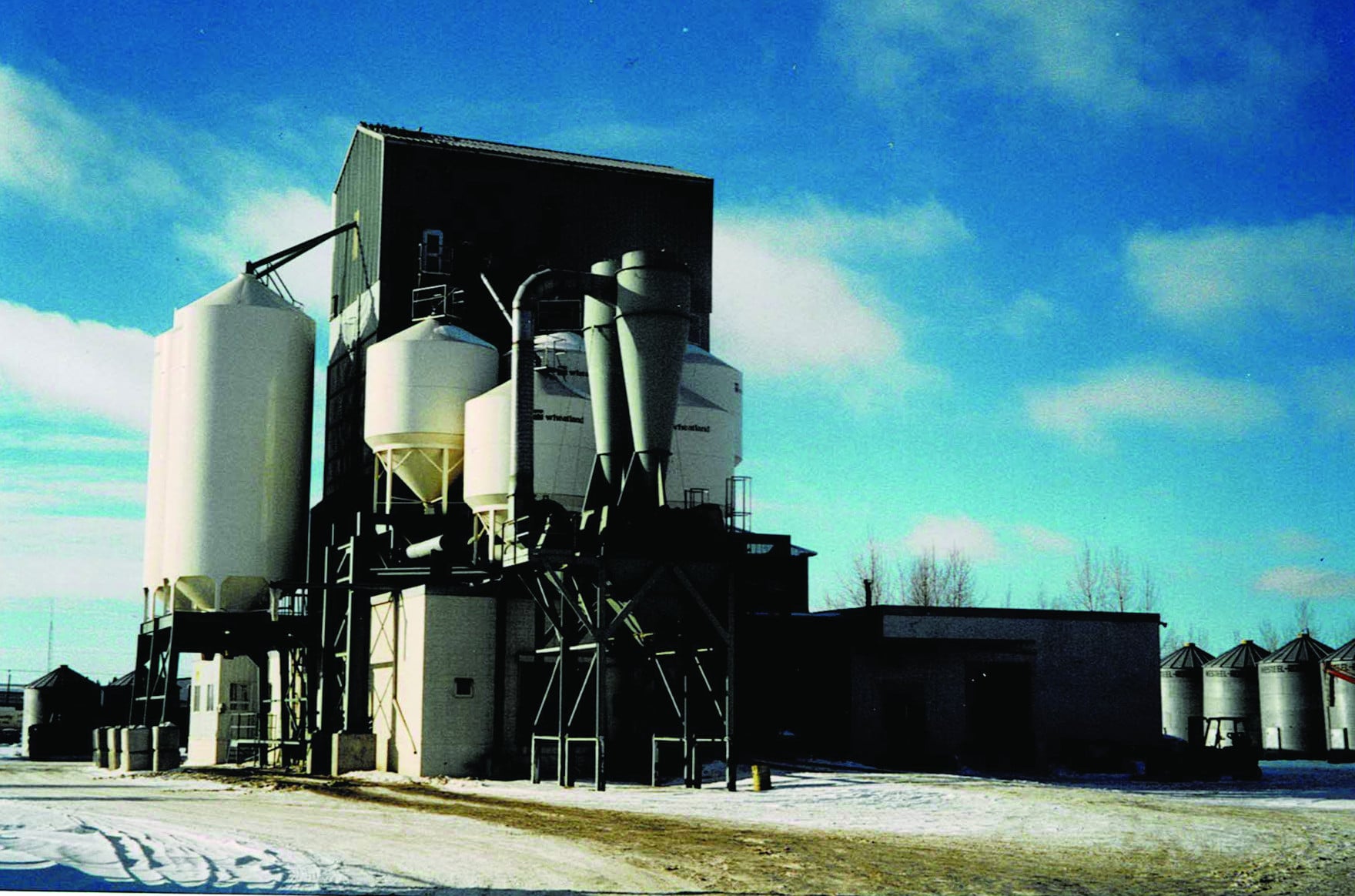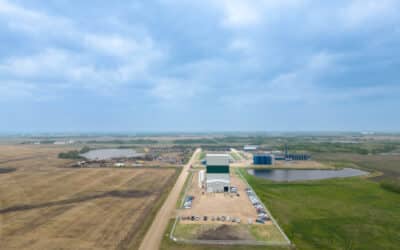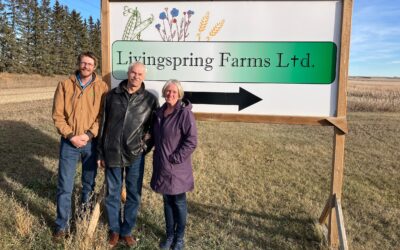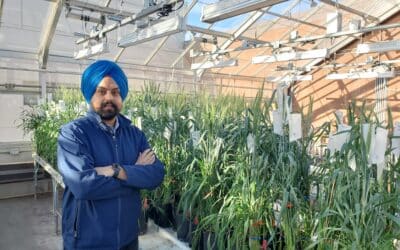When Wetaskiwin area farmers head to town to grab a burger, see a movie or do a little shopping, they have the option to add one extra item to their “get it done in town” list: having their seed cleaned. Wetaskiwin Seed and Grain Co-op (WSGC) has been a fixture on the southeast edge of Wetaskiwin since the early 1970s. Though the city has grown up around it over the past fifty years, WSGC holds true to its small-town charm and know-your-customers-by-name style of service.
What sets WSGC apart? Obviously, the plant’s purely operational benefits draw many farmers, says WSGC’s plant manager, Mike Mullin. “Our location is a bonus being on the edge of Wetaskiwin. We offer seed treating in the spring, which only maybe a third of plants offer. And we distribute multiple varieties of wheat and barley — probably about 10 of wheat and six of barley — so growers have lots of choice.”
A factor that is at least as important, though, is the personal connection and service WSGC offers its customers.
“We’ve been around here for a long time. Farmers know us and trust us, and know we’ll do an excellent job. We try to accommodate everyone as best we can. We’ll get the producers who clean 150 bushels and the producers who clean 15,000. We value all our customers whether they’re big or small,” says Mullin.
WSGC cleans about 450,000 metric tonnes of grain annually. It has the storage capacity to handle approximately 300 metric tonnes of incoming grain and store approximately 600 metric tonnes of clean grain. Yet, a quick calculation of the many white bins standing in WSGC’s bin-yard shows significantly more bin space than WSGC allocates for incoming and stored grain. That’s because WSGC stores and distributes seed for Wetaskiwin Co-op (formerly Parkland Fertilizers) and Nutrien Ag Solutions (formerly Viterra), and also stores seed that is owned and ultimately marketed by individual farmersseed growers.
“We have approximately 1600 metric tonnes of bin space, which includes about 30 bins. Most are owned by Co-op or Nutrien. We don’t sell those seeds; we just distribute it to people who arrange with those companies to buy it.”
Acting as a seed distribution point for just a couple major companies is a real change from the business model a couple decades ago.
“At one time, we probably had 50 bins outside, all belonging to different seed growers. They’d grow their pedigreed seed and sell it through our plant, and then we’d get a commission for handling it. Over the years, it’s gradually got to the point that people wholesale their seed to big companies rather than selling it on their own.”
That shift began in the early 2000s, when Viterra first approached Mullin with the suggestion. For WSGC, it added a new component and revenue stream to their business. For Viterra, it freed up valuable bin space in the spring at their own plants.
“They asked if they could use our plant as a testing ground for seed distribution. It hadn’t been done before that,” says Mullin. “They do it at other plants now, too, but we were the first to prove it would work.”
In order not to be in competition with its own clients, WSGC does not sell any certified seed of its own. It does, however, sell common seed of varieties that are not covered by plant breeder’s rights. On average, WSGC sells approximately 5,000 bushels of barley each year and approximately double that in oats.
WSGC’s geographic pull is large. In addition to drawing many of the 1,300 farms in the Wetaskiwin area, almost 40 per cent of the Co-op’s business comes from Leduc and Nisku. More farmers drive in from the Camrose and Ponoka areas.
The Wetaskiwin area is quite competitive for seed cleaning. Portables do a fair amount of business in the area; Warburg, Camrose, Bashaw, and Ponoka all have plants as well.
“Ultimately, producers have a lot of options. That’s a good thing for farmers,” says Mullin. “The portables have their place. They are a total convenience for the farmer, but they can never do the job that a seed plant can do. There will always be a place for seed plants. Seed plants are here to stay.”
WSGC is here to stay, yes, but perhaps not in exactly the location it occupies now.
“When our plant was built, it wasn’t built with a lot of extra space. Some additions have been put on over the years, but we’re tight for space. Ideally, the next step for us would be to buy some land outside in the country where we could stretch out more.”
While additional space would make managing the plant easier, the existing plant is entirely up-to-date with sorting and cleaning equipment.
“As far as the cleaning goes, you won’t find it done better anywhere else,” says Mullin.
Similar to all 67 other co-operative seed plants across Alberta, WSGC is run by a board of directors. Producers who purchase a share for $250 get $0.10/bushel off the cleaning rate, which means a share is essentially paid off after cleaning 2500 bushels. The co-operative model typically offers growers greater service — private seed cleaning plants typically only clean the limited number of varieties they grow. Co-ops are “open to everyone and everything,” says Mullin. “We’re here for the guys who grow certified seed but we’re also here for those that grow grain for feed or to sell to elevators.”
While Wetaskiwin’s growth has constricted WSGC’s ability to expand at its current location, one new building near the city may directly support the co-op’s continued success: a new 42,000 tonne grain elevator is slated to open later this fall south of Wetaskiwin.
“They are only a couple miles away from us. If people start hauling to that elevator, we may capture some new business if they bring us their grain to clean en route to the elevator.”
Mullin has one key message he wishes all farmers would take to heart: farmers sometimes need to invest a little to make a lot. His is a two-part investment recommendation.
First, update your seed, preferably every two to three years.
“You need to keep your seed fresh, so to speak. Older seed loses vitality and vigour. Yes, older seed will grow but if you add any stress — disease, cold, drought or moisture, or pests — you’ll see a visible difference in growth and yield,” he says. “Seed is your cheapest input. It’s not the place to try to save a few dollars.”
Second, virtually every farmer should be treating their seeds every year.
“I’d recommend it for every seed that goes in the ground. It’s very cheap insurance,” he says. “If you have wet falls like we’ve had the past few years, you definitely need to treat your seed in the spring because there is so much disease and bacteria that will be in your seed. But even after a dry fall, you want to treat your seed to hold off diseases that will attack your seed while it’s trying to grow, especially if it’s a cool, slow spring.”
Mullin has committed almost 25 years to WSGC so far. He says he’s got at least a few more still in him.
“I’m a born and raised country boy. Agriculture is my life. Ag is looked down on because it’s not always as dynamic or exciting as other industries. The money isn’t as good as the oil patch. But you know what? The farming industry in Alberta is a constant. Every year, it’s there. In a good year, a bad year, it’s still there. That’s why I’m still here. I believe in this industry and the farmers who make it happen.”





